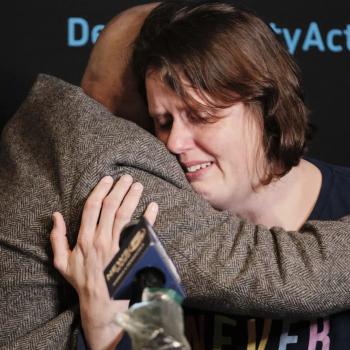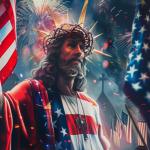by Ifeoma Ofulue
R3 Blogger
Though the election ends tonight, for American evangelicals a different kind of campaign should begin if we are serious about the place of faith-based identity and community as part of our civic engagement. It is clear to me, and to many others I’m sure, when you consider the entire slate of Republican primary candidates with professing evangelical Christians much at the helm, we have some serious reckoning to do. The past 19-months have laid bare, perhaps as never before or not as clearly, the stronghold of ethnocentricism in contemporary American evangelical culture, its political consciousness and moral imagination. Allow me in this post to break down what I mean, and why I believe the American evangelical community is long overdue for reckoning with the reality of racism in our ranks and its effects on the broader culture we seek to influence.
Adele Stan’s post yesterday is a good beginning for understanding deeply fundamental issues I have with this election cycle, particularly with rhetorics of religion, race, and gender that have surrounded it. In this regards, I agree with Stan’s assertion:
“Whether Obama wins or loses, new territory has been broken for the 21st century with the rhetoric of the Republican presidential campaign. Sure, it may seem like we’ve been here before, but the difference is that this time, it’s happening after we thought we had gotten past this level of racial hatred. But if Romney claims victory, having run on such a strategy, a new level of legitimacy will be conferred on the politics of race-baiting.”
But looking more closely at the role of faith in public life, an implicitly legitimate role I believe, there’s no getting around the fact that white evangelicals have played a peculiar role in the resurgence of racist, sexist, heterosexist ideologies at the core of one side of the current political discourse. Take Rick Santorum’s comments about not wanting to “make black people’s lives better by giving them somebody else’s money” and, his misrepresentation of President Obama on the work requirement within welfare at the Republican National Convention. For Santorum, an avowed evangelical and Romney’s chief competitor toward the end of the Republican primary, blackness and welfare are never far removed.
Attacks against immigrants, religious minorities, African Americans, single mothers, and others, throughout this campaign, have came not from the margins of our culture but from within public leadership, out of the mouths of elected officials who proudly identify and cloak themselves in the evangelical Christian tradition. Through my research, I’ve come to understand their ascendancy to national leadership is as much a testament to the success of their religious self-representation as to their political heft. Indisputably, white evangelical leaders–who have become the American face of an entire tradition–have volunteered and successfully leveraged their voices to give renewed legitimacy to an old and narrow socio-political standpoint. The entire republican presidential campaign has satisfied decades-long efforts of a subset of evangelicals seeking to “recover” neo-traditional ideals of gender, family, and economics not just in church but in the larger society. No doubt, these evangelicals are satisfied with their efforts.
For so long, America’s growing pluralism has been the object of white evangelical angst, a perceived threat to American identity. The twin evils of feminism and secular humanism are the culprits, out to destroy the social, political, and economic order of a world they understand as intrinsically God-ordained–a Christian social order that is distinctly American, predominantly Anglo-centric. Most of us get the incongruities here, especially those of us evangelicals who hail from other parts of the world. But among white American evangelicals, ignorance and denial are widespread. So too is the fear of the consequences of speaking publicly about the stronghold of racism, which has always intersected with gender and sexuality throughout American history.
Evangelicals in the United States, white and non-white, must take what this campaign season has revealed about our community and begin to account for the contempt and divisiveness that makes enemies of our fellow citizens. For those who are serious, may I suggest you begin with Emerson and Smith’s Divided by Faith: Evangelical Religion and the Problem of Race in America (2001)?















